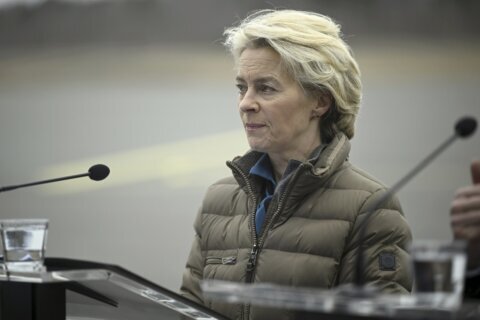BERLIN (AP) — Outgoing Chancellor Angela Merkel’s center-right bloc sought to win over the environmentalist Greens for a possible coalition Tuesday as the parties that hope for a share of power in Germany wrapped up their first talks on forming a new government.
The Union bloc’s candidate for chancellor, state governor Armin Laschet, led it to its worst-ever result in Germany’s Sept. 26 parliamentary election. The bloc’s only hope of keeping the top job is a coalition with the Greens and the pro-business Free Democrats, who came in third and fourth in that vote.
The Greens and the Free Democrats held separate exploratory meetings Sunday with the center-left Social Democrats and their candidate, outgoing Vice Chancellor Olaf Scholz, who narrowly won the election and appears to have the best chances of succeeding Merkel.
The Union met with the Free Democrats on Sunday. Laschet said Tuesday his delegation has now had a “good exchange” with the Greens.
“We think such an alliance has a breadth in society that really makes it possible to modernize and move forward the country in the coming years,” he said, adding that differences are “not insurmountable.”
Negotiators have said little of substance about the talks, with all vowing to keep their conversations confidential after Merkel’s attempt four years ago to form a coalition with the Free Democrats and Greens bogged down in details and leaks.
Still, apparent details of the Union’s meetings with the Free Democrats and Greens were reported by the Bild newspaper, and senior officials in both parties made clear their displeasure with the Union.
The Free Democrats eventually pulled the plug on the 2017 talks. That paved the way for a rerun of the “grand coalition” of the Union and the Social Democrats, Germany’s two traditional big parties, which has run the country for 12 of Merkel’s 16 years in power.
Another repeat of that often bad-tempered alliance, this time under Scholz, is mathematically possible this time but no one wants it.
Either the Greens, who traditionally lean left, or the Free Democrats, who have tended to ally with the Union, face a decision on whether to help a party from another ideological camp take Germany’s top job. Merkel will remain as a caretaker leader until a new government is formed and her successor is sworn in.
Questions have been raised about whether the Union is in any state to lead a new government, given that the election result weakened Laschet badly.
The Greens’ leaders were tightlipped on the Union’s hopes of further talks. Co-leader Robert Habeck said the Greens and the Free Democrats would each mull the results of the first meetings “today and tomorrow.” He refused to comment on rumors that the Union might replace Laschet.
“It’s always the case that a government works particularly well when authority within a party is clear and set, but that’s a general statement,” Habeck said.
Laschet, the governor of North Rhine-Westphalia state since 2017, said before the election that he would go into federal politics whatever the outcome.
On Tuesday, he said he plans to remain as governor until Oct. 26, when the new federal parliament holds its first meeting, the dpa news agency reported. He proposed as his successor the state’s transport minister, Hendrik Wuest.
Wuest faces a state election on May 15 in which North Rhine-Westphalia’s governing coalition of conservatives and Free Democrats will defend a one-seat majority. In a tweet, he thanked Laschet and his party for their “broad support” for his candidacy.
___
For more AP coverage on Germany’s election: https://apnews.com/hub/germany-election
___
Read all AP stories about climate change issues at https://apnews.com/hub/climate-change.
Copyright © 2024 The Associated Press. All rights reserved. This material may not be published, broadcast, written or redistributed.







